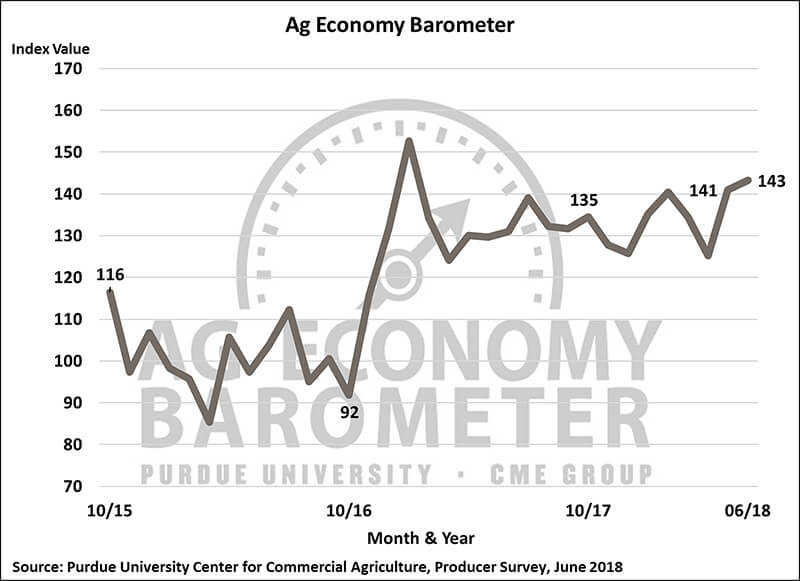July 3, 2018
Producer sentiment inches up despite commodity price decline and continued trade war concerns
 |
|
The Purdue/CME Group Ag Economy Barometer records rise in producer sentiment despite a fall in crop prices. (Purdue/CME Group Ag Economy Barometer/James Mintert) |
WEST LAFAYETTE, Ind. and CHICAGO – Agricultural producer sentiment rose slightly in June according to the Purdue University/CME Group Ag Economy Barometer. The increase was unexpected given unresolved trade war concerns and sharp price declines for key commodities, including corn, wheat and, especially, soybeans during the month. The June barometer reading of 143 was only 2 points higher than May. The barometer is based on a monthly survey of 400 agricultural producers from across the country.
“In June, we saw a sizeable drop in commodity prices that caught many observers by surprise,” said James Mintert, the barometer’s principal investigator and director of Purdue University’s Center for Commercial Agriculture, “But, despite the price decline, producers’ appraisal of current economic conditions improved compared to May. However, it was clear from survey responses that uncertainty regarding the agricultural outlook increased considerably.”
The barometer’s rise was underpinned by an increase in the Index of Current Conditions, which climbed to 138 compared to a reading of 132 a month earlier. The Index of Future Expectations remained nearly unchanged with a reading of 146 in June, 1 point higher than in May.
Each month the survey asks producers whether they expect “good times” or “bad times” in U.S. agriculture, both one-year and five-years ahead. This month, respondents provided mixed responses with many producers shifting to “neutral” and away from a “good” or “bad” response, that suggests a rise in uncertainty for the future. Several times a year, the barometer also asks producers if they expect prices for key commodities to move higher, lower or remain unchanged over the next 12 months. Compared to the beginning of 2018, producers have been slowly signaling that they expect commodity prices to recede and this trend continued in June with an increase in the percentage of producers expecting lower prices.
The June barometer survey also asked producers how much their crop acreage changed in 2018 and whether or not they use flexible cash rental leases to rent farmland. As expected, most farmers’ crop acreage did not change in 2018 compared to a year earlier, but the survey revealed that some farms were expanding crop acreage rapidly. For example, 8 percent of farms increased their crop acreage by more than 10 percent, and 6 percent of farms increased their crop acreage by up to 10 percent in 2018, compared to 2017. Usage of flexible cash rental leases has been increasing recently and, among the farms in the survey that rent cropland, 36 percent reported they plan to use a flexible cash rent lease on some of their acreage.
“Flexible cash rent leases provide a way for farm operators to share some risk with land owners, while also providing landowners some of the stability that comes with a cash rental agreement. The increase in volatility in crop agriculture could be stimulating interest in flexible cash rent leases,” said Mintert.
Read the full June Ag Economy Barometer report at http://purdue.edu/agbarometer. This month’s report includes additional information on producer’s motivations for utilizing flexible cash rents and making large investments in their farm operations.
The Ag Economy Barometer, Index of Current Conditions and Index of Future Expectations are available on the Bloomberg Terminal under the following ticker symbols: AGECBARO, AGECCURC and AGECFTEX.
About the Purdue University Center for Commercial Agriculture
The Center for Commercial Agriculture was founded in 2011 to provide professional development and educational programs for farmers. Housed within Purdue University's Department of Agricultural Economics, the center’s faculty and staff develop and execute research and educational programs that address the different needs of managing in today’s business environment.
About CME Group
As the world’s leading and most diverse derivatives marketplace, CME Group (www.cmegroup.com) is where the world comes to manage risk. CME Group exchanges offer the widest range of global benchmark products across all major asset classes, including futures and options based on interest rates, equity indexes, foreign exchange, energy, agricultural products and metals. Around the world, CME Group brings buyers and sellers together through its CME Globex® electronic trading platform. CME Group also operates one of the world’s leading central counterparty clearing providers through CME Clearing, which offers clearing and settlement services across asset classes for exchange-traded and over-the-counter derivatives. CME Group products and services ensure that businesses around the world can effectively manage risk and achieve growth.
CME Group, the Globe logo, CME, Chicago Mercantile Exchange, Globex and E-mini are trademarks of Chicago Mercantile Exchange Inc. CBOT and Chicago Board of Trade are trademarks of Board of Trade of the City of Chicago, Inc. NYMEX, New York Mercantile Exchange and ClearPort are trademarks of New York Mercantile Exchange, Inc. COMEX is a trademark of Commodity Exchange, Inc. Dow Jones, Dow Jones Industrial Average, S&P 500 and S&P are service and/or trademarks of Dow Jones Trademark Holdings LLC, Standard & Poor's Financial Services LLC and S&P/Dow Jones Indices LLC, as the case may be, and have been licensed for use by Chicago Mercantile Exchange Inc. All other trademarks are the property of their respective owners.
Writer: Kami Goodwin, 765-494-6999, kami@purdue.edu
Source: Jim Mintert, 765-494-4310, jmintert@purdue.edu
Media Contacts:
Lisa Swain, Purdue University, 765-494-8151, swainl@purdue.edu
Chris Grams, CME Group, 312-930-3435, chris.grams@cmegroup.com
Related websites
Purdue University Center for Commercial Agriculture
Agricultural Communications: (765) 494-8415;
Darrin Pack, dpack@purdue.edu